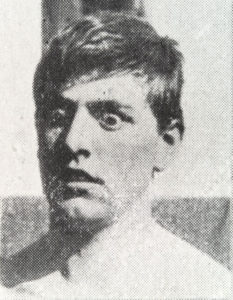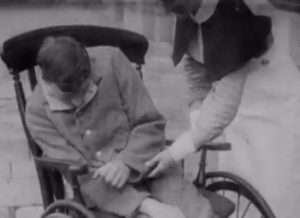
Patient Suffering From War Neurosis in WWI
Nostalgia (see last post) had been used since ancient times to describe a debilitating depression that sometimes affected soldiers. This was more than a simple longing to see loved ones or get away from the stress of battle; instead, it was an overwhelming emotional condition that could actually lead to illness and sometimes death. The term dropped out of favor after the U.S.’s Civil War, but medical personnel recognized that soldiers faced particular mental challenges during wartime. During WWI, “shell shock” was a descriptive term for the physical effects that constant bombardment took on soldiers in the trenches. Physicians recognized that soldiers could also suffer mentally from war, and called this condition “traumatic neurosis.” However, the public tended to use “shell shock” to describe any after-effects soldiers suffered.

Still From a 1917 Documentary of War Neuroses, Netley Hospital in Southampton, Hampshire, England
WWI-era physicians understood more about war-related mental trauma than their Civil War counterparts, and they knew that it would occur if the U.S. entered the war. In 1917, the National Committee for Mental Hygiene formed a task group called “the committee on furnishing hospital units for nervous and mental disorders to the United States Government” which began to canvas likely facilities in which to house mentally ill soldiers. Veterans Hospitals were obvious sites, but the committee also contacted the officials at the federal government’s two insane asylums: St. Elizabeths Hospital in Washington, DC and the Canton Asylum for Insane Indians in South Dakota.

Volunteers at St. Elizabeths Hospital Working With Shell Shocked Soldiers, courtesy George Washington University
St. Elizabeths had been created specifically for the military’s insane (and the indigent insane of the District of Columbia), but the Canton Asylum was created solely for Native Americans and had far fewer resources to treat shell-shocked veterans. Most soldiers who went to a government-run asylum went to St. Elizabeths.